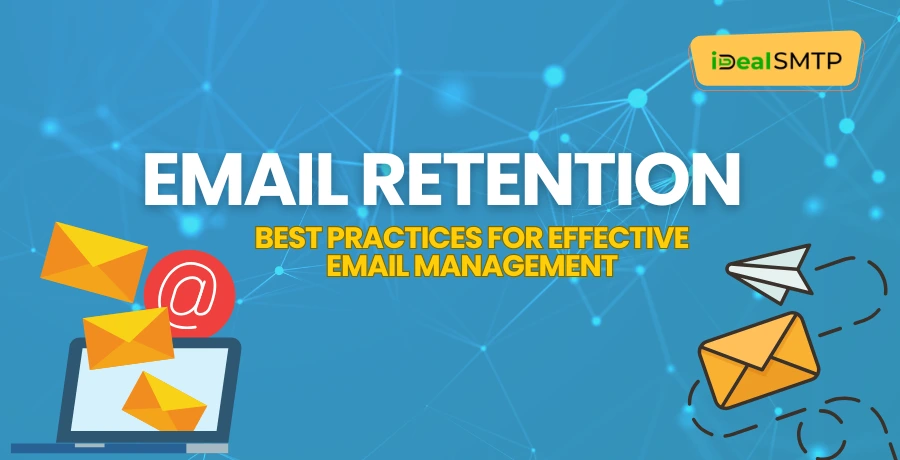An effective email management system represents a vital business communication tool that must also include precise strategies to handle email data storage duration. Organizations that have a well-established email retention policy will fulfill their legal obligations without accumulating excessive data and enhance both marketing services and operational efficiency.

In this article, we will explore email retention, email retention policies, email retention best practices, email marketing services, and how businesses can optimize their strategies to enhance efficiency and compliance.
Table of Contents
Pricing
| Trail Plan | Standard Plan | Premium Plan | Professional Plan |
| $50 | $145 | $185 | $225 |
| Sending Limit | Sending Limit | Sending Limit | Sending Limit |
| 1000 Emails/Hour | 1500 Emails/Hour | 3000 Emails/Hour | 5000 Emails/Hour |
What Is Email Retention?
Companies store their emails according to organizational requirements as well as compliance regulations while following established business policies during this process. Different organizations determine email retention durations according to individual guidelines and external standards and their own company rules and legal requirements. Every organization depends on efficient email management through comprehensive policies that both protect important data and maintain ready access to essential messages.
Importance of Email Retention
The organization needs to establish complete email retention practices because they provide numerous essential benefits.
- Regulatory Compliance- The financial and healthcare sectors together with other industries must follow specific laws that determine email storage periods. The regulations include GDPR, HIPAA, and SEC rules among others.
- Litigation Support– Electronic mail messages function as important proof for courtroom situations. Selectively stored data through retention acts as proof for legal proceedings.
- Data Management– Standards for data management become easier due to a well-established policy that prevents inefficient data storage while safeguarding key email access.
- Security and Privacy– The practice of keeping email records for suitable durations decreases both cyber attacks and safeguards user privacy.
- Improved Business Continuity– Strong business continuity results from holding appropriate business email communication which enables steady operations along with complete records of previous business exchanges.
What Are Email Retention Policies?
An email retention policy creates rules to determine both storage periods for emails as well as criteria for their removal from servers. The policy implements retention rules derived from governmental standards as well as business operational needs. The policy helps organizations maintain compliance standards alongside the achievement of secure and efficient email management procedures.
Key Components of an Email Retention Policy
- Retention Period- Organizations need to define through this element the duration that passed before permanent email deletion occurs.
- Categorization- The policy includes the classification of email types into separate specific categories for financial records marketing emails and human resource communications which each require their own individual storage duration.
- Archiving Mechanism- Email archiving mechanism refers to methods that determine where electronic messages will be saved through cloud servers or other storage options including internal infrastructure and external third-party platforms.
- Deletion Policy- A Deletion Policy describes both the schedule for deleting emails along the system protocols needed to perform such action.
- Access Controls- The access controls system of retained emails specifies which personnel can access them as well as their retrieval methods.
- Compliance Measures- Ensures alignment with industry regulations and legal requirements.
Email Retention Best Practices
To ensure effective email management, businesses should adopt email retention best practices that align with operational needs and regulatory compliance.

1. Define Clear Retention Periods
Different types of emails require different retention periods. For instance:
- Transactional Emails (e.g., receipts, invoices) – Retained for 3-7 years for accounting purposes.
- Legal Correspondence – Retained indefinitely or as per legal guidelines.
- Marketing Emails – Retained for a few months to analyze engagement but deleted once no longer needed.
2. Implement Automated Email Archiving
Using email marketing services and automation tools, businesses can streamline retention by automatically categorizing and archiving emails. Automation ensures compliance while reducing the burden of manual email management.
3. Ensure Regulatory Compliance
Organizations operating in highly regulated industries must align their email retention policies with legal mandates such as:
- GDPR (General Data Protection Regulation) – Requires businesses to store only necessary personal data and delete emails upon request.
- HIPAA (Health Insurance Portability and Accountability Act) – Mandates email retention for medical-related communications for a specific period.
- SOX (Sarbanes-Oxley Act) – Requires financial institutions to retain records for a minimum of seven years.
4. Use Secure Storage Solutions
Businesses should use secure email marketing services or cloud storage providers that offer end-to-end encryption, backup solutions, and disaster recovery plans. This prevents data loss and ensures the security of sensitive emails.
5. Establish Access Control and Monitoring
Not every employee needs access to all retained emails. Setting up access controls ensures that only authorized personnel can retrieve specific emails, reducing security risks.
6. Regularly Audit and Update Policies
Business needs and regulations evolve, so it’s crucial to review and update email retention policies periodically. Regular audits ensure compliance and identify areas for improvement.
7. Train Employees on Email Retention
Organizations should educate employees about email retention policies and best practices. This includes:
- Identifying emails that need to be retained.
- Understanding compliance risks.
- Avoiding unnecessary email storage.
How Email Marketing Services Help with Retention
Email marketing platforms help businesses retain their email communications through automated systems that manage the retention of messages by established policies. Businesses that select professional email marketing services acquire multiple benefits which include:
- Automated Compliance Management- Professional platforms include compliance management systems that help users achieve legal retention requirements.
- Advanced Email Archiving- Services like Mailchimp, Brevo, and SMTPget offer secure storage options.
- Efficient Email Categorization- AI technologies help professionals classify their emails through automated systems that determine both their content value and priority rankings.
- Data Recovery and Backup- A data recovery system coupled with backup functionality provides users with the capability to restore forgotten emails.
- Enhanced Security Measures- This solution includes security features that deliver encryption protocols together with spam protection and user permission systems.
Conclusion
A well-defined email retention structure remains essential for businesses that need to preserve data compliance and achieve efficient management of their information while safeguarding confidential data. Organizations can improve email management and minimize legal-security hazards through the implementation of best practices which include retention period definition and automation regulatory compliance and email marketing services usage.
Businesses need to monitor email retention policies through periodic updates according to changing regulations and business requirements. A correctly implemented strategy enables businesses to strike the best possible ratio between data retention needs and operational efficiency which results in smooth business processes.







